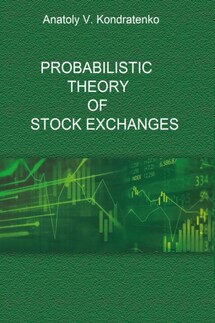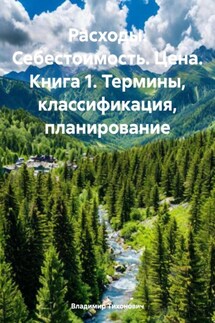Probabilistic Theory of Stock Exchanges - страница 4
p>M – probabilistic market price
q – independent quantity variable
q>M– probabilistic market quantity
Q – quantity
PQ – price and quantity
S – supply
SBER – Sberbank shares
S D – supply and demand
S(t, p, q) – probabilistic market supply function
S>0(t) – total market supply function
t – independent time variable
TV(t) – trade volume
T – time
USD/RUB – USD/RUB futures at MOEX: U.S. dollars are traded for Russian rubles (₽).
INTRODUCTION
"The impartial observer can have no doubt about the reason our generation pays general and enthusiastic tribute to progress in the field of the natural Sciences, while economic Science receives little attention and its value is seriously questioned by the very men in society to whom it should provide a guide for practical action. Never was there an age that placed economic interests higher than does our own. Never was the need of a scientific foundation for economic affairs felt more generally or more acutely. And never was the ability of practical men to utilize the achievements of Science, in all fields of human activity, greater than in our day. If practical men, therefore, rely wholly on their own experience, and disregard our Science in its present state of development, it cannot be due to a lack of serious interest or ability on their part. Nor can their disregard be the result of a haughty rejection of the deeper insight a true Science would give into the circumstances and relationships determining the outcome of their activity. The cause of such remarkable indifference must not be sought elsewhere than in the present state of our Science itself, in the sterility of all past endeavors to find its empirical foundations. The reason for this conspicuous indifference is none other than the present state of science itself, the fruitlessness of hitherto attempts to comprehend its empirical foundations".
Carl Menger [2007].
"Next, the empirical background of economic science is definitely inadequate. Our knowledge of the relevant facts of economics is incomparably smaller than that commanded in physics at the time when the mathematization of that subject was achieved. Indeed, the decisive break which came in physics in the seventeenth century, specifically in the field of mechanics, was possible only because of previous developments in astronomy. It was backed by several millennia of systematic, scientific, astronomical observation, culminating in an observer of unparalleled caliber, Tycho de Brahe. Nothing of this sort has occurred in economic science. It would have been absurd in physics to expect Kepler and Newton without Tycho, – and there is no reason to hope for an easier development in economics".
John Von Neumann and Oskar Morgenstern [1970]
The founding fathers of the Austrian school of economics established economic theory on a solid empirical footing in their day, which predetermined its successful development for many years to come. But the current levels of rigor of the underlying concepts and assumptions of these theories, as well as the quantitative description of real economic processes and phenomena, not to mention the quality of economic forecasts, are clearly insufficient for developing an evidence-based management of countries’ economies and achieving sustainable development of the global economy. There is a huge gap between the modern requirements that the society in its wide understanding presents to the economic science and the ability of this science to meet such requirements. This, as 150 years ago, generates a negative, at best ironic, public attitude to economic science, existing in the form of a number of often mutually exclusive theories, such as neoclassical economics and the Austrian school of economics (below often just Austrian economics), whose adherents give contradictory estimates, forecasts and recommendations. It has now come to the realization that empirical foundations alone are clearly insufficient for the verification of adequate models and approaches to economics. It is time to make a strict selection among all existing theories and currents of economic thought by means of their experimental verification in order to further develop economic theory, capable of providing a quantitative description of economic processes and phenomena at a high scientific level, comparable with the level of research in the natural sciences. As a result of this selection, economic theory will get a solid experimental foundation and become a unified economic science, like physics and other natural sciences, rather than a stream of ten parallel currents competing for financial resources, represented by neoclassical economics, Keynesianism, Marxism, etc.







